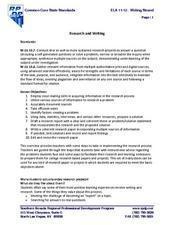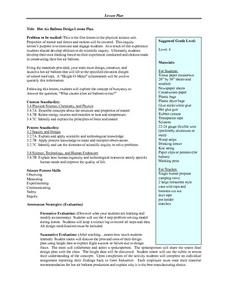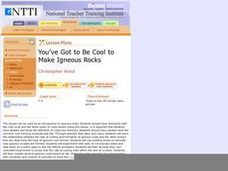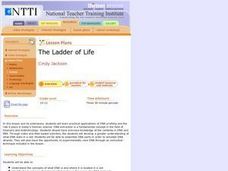Curated OER
Food for thought
Cake has to be good for something, right? Different foods are used by our bodies in different ways. Learners will first read about what fats, proteins, fruits, and vegetables do for the human body. They will then put each of food shown...
Curated OER
Magnets are forceful
You could use this worksheet two different ways. As is, or you could have learners actually do the experiment shown. They are to determine which magnet is strongest by counting the number of paper clips hanging from it. Why not get five...
Curated OER
Non-living Things
Very young scientists circle the things on the worksheet that they think are living things. Most of the pictures are of non-living things. A handy worksheet to use during any initial discussion about living vs. non-living things.
Foundation for Water & Energy Education
How Can a Dam Affect a River? Activity B
Second in a pair of activities, young ecologists continue to examine the food pyramid of a freshwater ecosystem. They take a look at the food pyramid drawn in Activity A and consider what would happen if a reservoir was created on the...
Curated OER
Identifying Minerals
Learners compare and constrast a wide variety of minerals and rocks. They test them for streak, luster, color and other characteristics. They view an exhibit and compare their answers to them.
Curated OER
Module 1, Unit 2, Lesson Plan 2: PCR and DNA Diagnosis
High schoolers discuss the importance of the Polymerase Chain Reaction for biologists. They explain what factors make the Polymerase Chain Reaction possible. Students explain the steps in thermocycling and what happens during each step.
Curated OER
Catalase: A Bioinformatics Case Study
Students investigate the physical structure of a protein by using a computer simulation tool. They record its primary amino acid structure while viewing it in three dimensions for a better visual recognition. There is also a comparison...
Curated OER
Seasons and Cloud Cover, Are They Related?
Students use NASA satellite data to see cloud cover over Africa. In this seasons lesson students access data and import it into Excel.
Curated OER
Exploring Ecosystems
Students examine the relationships between plants, animals, and the environment in ecosystems. They sort animal cards, collect natural materials from the schoolyard, and record an ecosystem web in the form of a poster.
Curated OER
What can money tell us?
Students study the physical presence, imagery and written text on a reproduction of colonial currency. They apply their research to a modern day quarter to compare and contrast two coins. In addition, they design their own colonial...
Curated OER
The Origin of Life: Alternative Views
Students explore the topics of faith and science as they relate to the origins of life. They consider the major points of Darwin's Theory of Evolution and brainstorm various explanations of how life began. Students investigate different...
Curated OER
HIV Prevention
Seventh graders engage in critical thinking skills about personal health and safety to prevent the acquiring of the HIV disease. The project is an extension of this thinking designed for students to think about all the different ways...
Curated OER
Tie Dye
Students practice writing research proposals to test the color fastness of a dye once it has been exposed to a t-shirt. Each proposal needs details of experimental design, length of treatment, and means of cleaning the shirt. All...
Curated OER
Scientists Write!
Students use a journal to record observations. They make notes about what research may be needed to answer questions that have come up in the field and sketch or make connections in the curriculum. They research bioinformatics and...
Curated OER
Who is the Sea Otter Related to?
Learners examine the genetic relationships of different organisms. In groups, they discover the importance of genes and how different amino acids show various evolutionary relationships. They use an online database to continue their...
Curated OER
Animal Keynote Report
Learners produce a research project on an animal. Using the Internet, they find pictures and information about animals. They are also given a list of items that should be covered in their report, including the appearance of the animals,...
Southern Nevada Regional Professional Development Program
Researching and Writing
Designed for teachers, this resource identifies problems learners face when attempting a research project and approaches instructors can use to help their class members overcome these obstacles. Suggestions are included for how to help...
Curated OER
The Middle Passage
Eighth graders locate the Middle passage and describe the experiences of slaves in the Middle Passage. In this Middle Passage lesson, 8th graders describe life as a slave during the Middle Passage. Students write as if they were a...
Curated OER
Hot Air Balloon Design Lesson Plan
Sixth graders discuss what they know and what they want to know about hot air balloon using a KWL chart. They then use a wide array of materials to design a hot air balloon that will lift successfully in cooperative groups referring to...
Curated OER
Layers of the Earth
Eighth graders study the earth's surface. In this planet structure lesson students view a PowerPoint presentation then draw and label the earths layers.
Curated OER
School Lighting Audit Preparation
High schoolers work together to develop a school lighting audit plan. They practice using new vocabulary related to an energy audit. They also identify the components of a school lighting audit.
Curated OER
You've Got to Be Cool to Make Igneous Rocks
Students describe how igneous rocks are formed, design a classification system to group igneous rocks and develop a controlled experiment to prove that the rate of cooling affects the size of the crystals.
Curated OER
The Ladder of Life
Students explain the concepts of what DNA is and where it is located in a cell, identify the two types of molecules that make up the rungs of a DNA molecule and identify the two types of Purine and Pyrimidine molecules
Curated OER
Rocks and Minerals
Students are able to describe earth processes (e.g., rusting, weathering, erosion) that have affected selected physical features in students, neighborhoods. They are able to identify various earth structures (e.g., mountains, faults,...
Other popular searches
- Inquiry Based Learning Maths
- Inquiry Based Learning Plant
- Inquiry Based Learning Science
- Inquiry Based Learning Space
- Math Inquiry Based Learning

























